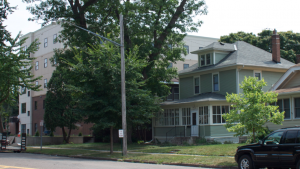As students prepare to move in for the school year, Josh Hengemuhle, area manager for Off-Campus Student Services, said off-campus students should take time to introduce themselves to neighbors to build a mutual respect.
“Our first recommendation is to meet (the neighbors),” Hengemuhle said. “It’s a lot easier to understand where people are coming from if you actually meet them in the light of day.”
While neighbor concerns regarding students living off campus are nothing new, the opening of a new apartment building on Grand Avenue and Finn Street this fall has caused even more of a stir among neighbors.

Justin Revenaugh, who lives a block away from the new complex near the corner of Lincoln Avenue and South Finn Street, said that while the apartment building is increasing the number of students living in the area, noise isn’t the biggest concern for neighbors.
“The noise is a concern, but the big concerns are, say, if there’s going to be 40 cars in the street come September,” Revenaugh said. “There’s obviously no place you can park on Grand, so they’ll come to our street next.”
Sophomore Adriana Velez is living in the Grand and Finn apartments come fall, and said she doesn’t anticipate noise being a big problem in the new building.
“I’m pretty confident that things will be OK,” Velez said. “I just think that neighbors should assume that students will be living off campus.”
Hengemuhle said he couldn’t speculate on whether or not the apartments could cause problems south of campus, but said from his experience, apartment buildings typically don’t receive as many complaints as other student residences off campus.
“I follow up on every complaint we get from neighbors, so anything I have an address for, I’m following up with students who live at that property, and what I can say is I rarely get complaints about apartment buildings,” Hengemuhle said. “The vast majority are single-family or duplex buildings that get complaints.”
Even for neighbors not living near the new apartments, students returning to campus and moving in to off-campus homes poses a threat to quiet evenings, especially in the fall.
“It kind of comes and goes,” Revenaugh said. “On this side of Finn it’s never been so bad, but on the other side of Finn (North Finn Street), I know people down there have had recurrent problems with certain homes.”
The weather often encourages students to spend time outside come September and October, and Hengemule said students living in homes without central air often leave their windows open, creating even more noise spread throughout neighborhoods. Students inviting people over to reconnect at the start of the year can also lead to neighbor complaints.
“It is a generally busier time in the neighborhood, commotion-wise, life, energy-wise, particularly from the student end,” Hengemuhle said.
Several blocks in the community have recently taken it into their own hands to make connections to student neighbors. Hengemuhle said he has heard of several streets that have held neighborhood block parties in early September, and said in the past, neighborhoods have seen “great success” when students show up.
“They get to meet the students in that very welcoming, comfortable setting,” Hengemuhle said. “(This year) we’re going to reach out to the students on those blocks that are doing that and really encourage them to attend those gatherings. Really, it’s the neighbors that are taking initiative, we just want (students) to understand they are encouraged and welcomed as well.”
Velez said although neighbors should expect students living off campus, students also need to be responsible neighbors.
“I think that one of the responsibilities of students living off campus is to understand that not everyone around them is a student and there will be families with kids,” Velez said. “(It) just adds to the responsibility of making sure you aren’t up super late with loud music or anything.”
Hengemuhle said ultimately, good neighborhood relations are a balance between the hopes of student renters and the hopes of residential neighbors.
“It’s a student’s property while they are renting if for that year of their lease, so what their hopes are for utilization of the property and how they can do that and still have people over occasionally should be balanced with the need to live in the community and the effect that has on other people,” Hengemuhle said.
Gabrielle Martinson can be reached at mart5649@stthomas.edu.

